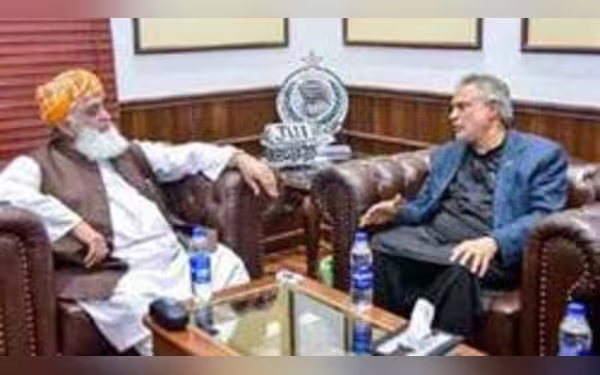Sunday, October 6, 2024 12:24 AM
Fazlur Rehman Rejects Judicial Reforms Without Consensus
- Fazlur demands consensus on judicial reforms.
- He questions the urgency of proposed amendments.
- Past amendments required extensive deliberation.
 Image Credits: nation_pk
Image Credits: nation_pkFazlur Rehman opposes judicial reforms, calling for consensus and questioning the urgency of proposed amendments in Pakistan.
In recent developments, the political landscape in Pakistan has been stirred by the firm stance of Jamiat Ulema-i-Islam-Fazl (JUI-F) chief Maulana Fazlur Rehman regarding the proposed judicial reforms. The federal government has put forth a constitutional package aimed at amending certain judicial processes, but Fazlur has made it clear that he will not support these changes without a broad consensus among political parties.
During a press conference held in Islamabad, Fazlur emphasized that rushing such significant amendments through parliament is not acceptable. He stated, "We accept the court’s decision, but it should not be used for match-fixing. The government needs to explain why there is such an emergency to pass these amendments." This statement reflects his concern that the proposed changes may be politically motivated rather than genuinely aimed at improving the judicial system.
Interestingly, Fazlur had previously shown some openness to the idea of establishing a constitutional court and had not outright rejected proposals to limit the tenure of the Chief Justice of Pakistan to three years or to raise the retirement age for judges. However, he firmly believes that any constitutional amendments should not be tailored to benefit specific individuals. He stated, "We want constitutional amendments to be made with consensus, ensuring they do not trigger political unrest in the country." This highlights his desire for a more collaborative approach to governance.
Fazlur's call for consensus is particularly relevant in a political environment often characterized by division and conflict. He urged the government to postpone the proposed amendments, suggesting that political differences should be resolved through dialogue rather than protests. He questioned the urgency of the government's push for these changes, saying, "I don’t understand the haste; there is no emergency." This sentiment resonates with many who believe that significant reforms should be carefully considered rather than hastily implemented.
Reflecting on historical precedents, Fazlur pointed out that constitutional amendments typically require time and deliberation. He noted, "Even the 18th Amendment took nine months to pass. They are asking to pass a Constitutional Amendment within a single day. This is not possible." His remarks serve as a reminder that meaningful change often necessitates patience and thorough discussion.
The ongoing debate surrounding the proposed judicial reforms underscores the importance of consensus in Pakistan's political framework. As the JUI-F chief advocates for a more measured approach, it becomes evident that the path to effective governance lies in collaboration and understanding among all political factions. The future of these amendments will depend not only on the government's willingness to engage with opposition parties but also on the broader commitment to uphold democratic principles and ensure that any changes serve the best interests of the nation.













